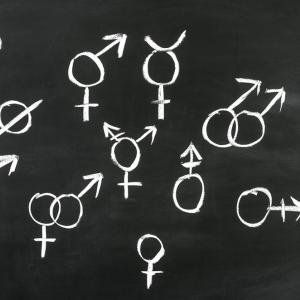
Greg Williams works in digital communications at an advocacy organization in Washington, D.C.
After completing a fruitful academic career at Trinity School for Ministry and Geneva College, Greg sought to put into action all of the academic sociology, history, and theology he had learned. He shifted from merely studying the problems of the world to doing something about those problems in a year at Sojourners before moving on to his current position. His passion, academically and otherwise, is in enabling the church to use her resources to help bring about a more just society.
As you may imagine, this is fairly exhausting, so at home he usually just naps, between baking bread and biking around his beautiful city.
Greg tweets @gwilliamsster and blogs at fourthconfession. Please don't yell at him too much, but I have it on good authority he'd like it if you said hi.
Posts By This Author
Iran Deal Announced This Morning

Image via Petr Kratochvila/Shutterstock
The U.S. and five allied world powers (China, Russia, UK, France, and Germany) have worked out an agreement with Iran restricting its nuclear program, President Obama announced from the White House this morning. The deal limits Iran’s ability to enrich uranium, and thus develop nuclear weapons, in return for a gradual easing of UN sanctions and financial controls on Iran.
This plan, the Joint Comprehensive Plan of Action, is years in the making. It took its nascent form in November 2013 with a new Iranian president Hassan Rouhani, then was fleshed out in a framework agreement in April this year. The most recent push to the agreement took 18 full days of talks in Vienna among top diplomats from every country involved.
Though a deal has been announced, it already faces opposition, both internationally from Israel and Arab states and domestically from Congress. Congress has sixty days to review the deal, in what is expected to be a difficult political fight over President Obama’s foreign policy.
The full text of the deal is available here.
Free to Be He
'Malestrom: Manhood Swept into the Currents of a Changing World,' by Carolyn Custis James. Zondervan.
MANHOOD SEEMS to be in crisis today, for a host of reasons ranging from silly (a feminized church because of too many altar girls?) to serious (a porn and video game epidemic, alienating boys and men). Carolyn Custis James’ Malestrom gives needed context by pointing this crisis of masculinity back to humanity’s very fall into sin and the patriarchy that sin generated. She calls this patriarchy the “malestrom”—a societal whirlpool that sucks men into a broken way of life and destroys them.
The malestrom is unfortunately familiar to us, although James explores its contours in compelling detail. Sin manifests itself in men through a patriarchal hierarchy that leads us to resort to violence to establish status. The dominant model of what it means to be a man is to father children, provide for them economically, and protect them from the outside world. In light of this, how can we be surprised that we have hurting men and boys in our church who don’t fit in that model?
James tells biblical stories of men who pushed back against the patriarchal order to better reflect the image of God—men and women together in a “blessed alliance” to bring God’s kingdom. These stories culminate in the example of Jesus as the ultimate man who lived fully into a healthy masculine identity.
S.C. House Approves Removal of Confederate Flag

Image via Steven Frame/Shutterstock
Today, at 4:00 p.m. EST, Governor Haley of South Carolina intends to sign a bill to take down the Confederate battle flag that is currently flying over the state capitol. The flag itself will be removed at 10:00 a.m. on Friday, and moved to a museum.
Calls for the removal of the Confederate flag, seen as a symbol of racism and oppression, have been buildingsince the murder of nine African-American men and women at Emmanuel AME in Charleston, S.C., last month. Dylann Roof, the accused murderer who is alledged to have been motivated by racial hate, has several pictures online posing with the flag as a symbol of white supremacy.
The flag itself increasingly been seen as a symbol of hate, even among traditionally conservative white southern Christians, with Russell Moore of the Southern Baptist Convention going so far as to say that “the cross and the Confederate flag cannot co-exist without one setting the other on fire.”
This decision to take down the flag made its way through a marjoity vote in the South Carolina House earlythis morning. The vote comes nearly two weeks after Bree Newsome, a Christian activist, took down the flag herself in an act of civil disobedience on June 27. For her, this was an act “not only in defiance of those who enslaved my ancestors in the southern United States, but also in defiance of the oppression that continues against black people globally in 2015.”
Most Americans Believe God has a Special Relationship With the U.S.
Following the Fourth of July weekend, a recent Lifeway Research poll shows that most Americans believe that God has a special relationship with the United States.
Evangelical Christians are particularly likely to believe that God has a special relationship with the U.S. — with two-thirds agreeing with that statement — but it has a broad base of support, with even a third of those identifying as not religious agreeing with it.
"53 percent of Americans say they believe God and the nation have a special relationship, a concept stretching back to Pilgrim days. Even a third of atheists, agnostics, and those with no religious preference believe America has a special relationship with God," says the report.
This belief in a special relationship, often called American exceptionalism, has a long history, from ideas of Manifest Destiny (and whiteness) to calls for justice and a moral responsibility, as in Dr. Martin Luther King, Jr.’s "I Have a Dream" speech.
"Some Christians view America as an archetype of biblical Israel, chosen and uniquely blessed by God," Ed Stetzer, executive director of Lifeway Research, said.
And today, despite social, economic, and political crises regularly in the headlines, American optimism remains high — only 4 in 10 Americans think America’s best days are behind us.
Read the full report here.
Review: 'Understanding Gender Dysphoria'

Image via 501room/Shutterstock
Transgender people, especially in the church, have a history of being an object of culture war fights, so humanizing personal struggle is important. This is especially true for Understanding Gender Dysphoria’s audience of evangelical seminarians. We should encourage anything such as this that improves pastoral care for sexual minorities within the evangelical church, especially for those of our friends who are not affirming.
Yet I don’t imagine Yarhouse will make many people happy in Understanding Gender Dysphoria — the LGBTQ activist, the secular counselor, and the evangelical pastor will all be uncomfortable at one time or another. He is at a tricky intersection between faith and psychiatry, but one where he needs to be to help conservative Christians attempt to negotiate difficult issues of identity.
I’m excited that the evangelical world is paying attention to these issues, but there is much more that needs to be done to determine what humane pastoral care looks like for people with gender dysphoria.
Welcoming the Undocumented
The primary challenge facing immigration laws in the United States is not people crossing the border without authorization. In fact, a recent study from Pew Research Center shows that fewer people than ever are attempting to cross the border.
Rather, our dilemma with immigration is that people who are already here — some for several decades — without proper documentation face substantial difficulties in trying to integrate and contribute to the country.
If We Love Jesus, We Should Take Care of His Stuff
Why does caring about Jesus mean we should care for the earth? There are plenty of Old Testament passages about the lordship of God over all creation, but let’s limit ourselves, for the sake of evangelical argument, to Jesus. He cares about ecology because of his incarnation into creation, his miracles restoring creation, and his lordship over creation.
But What About Intersex? 'Sex Difference in Christian Theology' Questions Churches' Views
Some children are born without being clearly one sex or another, usually in the case of having ambiguous genitals. Even as puberty progresses, a few medical conditions can arise that make it impossible to label a child a boy or a girl. These children, usually referred to as intersex, have faced shame and alienation from society and sometimes even painful and invasive surgeries to “correct” the way they were born. Sadly, this trauma is often inflicted by Christian communities.
Megan DeFranza’s Sex Difference in Christian Theology challenges that treatment. Written primarily for Christians with more conservative views on sexuality, the book shows how the demographically small but pastorally significant question of intersex people points to larger problems within a Western conservative theological anthropology. If we understand the Trinity to be reflected in our sexual or marital relations, we end up with some seriously problematic theological and pastoral implications for our broader treatment of gender and sex.
DeFranza’s key pastoral goal is to enable conservative Christians to hear the voices of intersex people and to understand their concerns over non-consensual surgeries and exclusion from the life of the church.
Purple Solutions to Poverty
Robert Putnam, who spoke this Monday at Georgetown for the Catholic-Evangelical Summit on Overcoming Poverty, gives a great stump speech for poor kids who are falling through the cracks in our society. So much so that moderator John Carr described Putnam as an Old Testament prophet with charts — Isaiah, with a good grasp of Powerpoint.
Our culture has been terrible at providing opportunities to poor children. Putnam’s data finds that poor children have fewer chances to do well in school and less parental involvement, and are generally isolated from society and even from church. With this background, we shouldn’t be surprised that children who are born into poverty have trouble finishing college and building a stable, prosperous life.
Putnam calls this the "chief moral crisis of our time."
‘Stand Your Ground’ Shows a Racist Culture, Continuing to Kill
Douglas writes in response to the murder of Trayvon Martin, tracing the intellectual and cultural genealogy of a “stand your ground” culture — one that polices our public ‘white’ spaces, and kills men and women of color who are in them. Sadly, as the deaths of Michael Brown and Freddie Gray show, our cops and our culture are still killing innocent people of color. We aren’t a post-racial culture at all.
Stand Your Ground takes a cruciform shape: we face the death of the cross in her depiction of the despair of a culture that kills its citizens, before rising in the resurrection hope of a black faith.
Birthright Citizenship: A Historic American Right In Danger
Historically, the United States has said as long as you were born here, you are from here — a principle called birthright citizenship. It doesn’t matter who your parents are or what your family history is — as long as you were born on U.S. soil you are a citizen. This was codified in the 14th Amendment, which sought to finally grant citizenship status to African Americans living in the United States rather than leaving them in legal limbo.
A hearing on the House Judiciary Committee’s Subcommittee on Immigration and Border Security last Wednesday explored ways to change this tradition of birthright citizenship pointing to ostensible problems with pregnant women travelling to the U.S. specifically for the purpose of giving birth as well as what the committee sees as substantial public support for moving away from it.
'The Road to Character' Misses Grace
Virtue is worth thinking about. We should think, carefully, about the kind of person we want to be and the kind of habits we want to develop. In The Road to Character, Brooks asks these questions of us, rightly urging us to be concerned with developing an inner moral life of virtue and integrity. Unfortunately, his self-focused attitude toward morality leaves little room for grace for the morally weak — which is all of us.
When asked directly about the relation of grace and individual agency, at a recent Trinity Forum event, Brooks confessed that he simply didn’t know — that he had no idea which of the two should take precedence.
I don’t know Brooks’ personal faith, nor do I intend to cast aspersions on his morality. Still, he panders to all of my worst inclinations in writing The Road to Character as a stoic moral theology, with only slight glimmers of grace to lighten the way. Brooks holds up several vastly different exemplars of a moral life, from Montaigne to Eisenhower, who are united in a certain integrity and humility — an unwillingness to be governed by circumstances that are outside of our control, while focusing on the things that we can.
Brooks reduces God to being a helper needed by some, while others are perfectly capable of struggling through their moral issues alone. To Brooks, a self-built journalist should be imitated as much as a grace-oriented social worker, or a novelist who was motivated by adulterous love as much as a bishop who was driven by love for God. In his moral universe, there are many ways of developing yourself. The better ones focus on building virtues rather than a resume, but all provide pathways for individual development.
'Arriving at Amen' Arrives, For Some
Arriving at Amen, the forthcoming memoir-infused guide to spiritual practices by Leah Libresco, reads like a fantastic series of blog posts combined into a less-spectacular guide for small groups getting their hands dirty with spiritual practices. Oddly, Leah seems to respect her audience a bit too much by assuming that they are as geeky and morally driven as her. This limits Arriving at Amen’s usefulness in the pastoral context, which it seems marketed and designed for — but makes it more interesting for me.
Leah has a great internet presence — from her blog Unequally Yoked to a new radio show Fights in Good Faith and now reporting and doing analysis for FiveThirtyEight. Leah is, basically, a very liberally well-educated math nerd who turns to religion in the same way that she turns to everything – full-voiced and with the intention to win.
Arriving at Amen riffs on some historic spiritual practices, all billed as Roman Catholic (though I, as a cranky reformed Presbyterian, can still get some mileage out of them) such as the Divine Office, examen, lectio divina, and several others.
Leah has lots of helpful tips here. The Divine Office (a set structure of prayers that I’ve found healthy in my own life) can become a means to organize your time and a way to transition to and from work on your commute. She suggests using the Jesuit daily self-reflection of the examen as way to proactively think about virtues that you can cultivate rather than as another opportunity to spiral into guilt. She even rethinks lectio divina, the practice of meditation on scripture, by suggesting that the reader translate scripture into another language as she does with American Sign Language.
All of this is helpful advice — but it also demonstrates the scattershot nature of Arriving at Amen.
National Latino Evangelical Coalition Calls for Death Penalty Repeal
The National Latino Evangelical Coalition has voted to support repeal of the death penalty, calling it an anti-life practice. Urging their 3,000 congregations to support efforts to end capital punishment across the country, NaLEC joins an increasing number of Christians across the country and internationally who are realizing afresh the moral problems with the death penalty. Most recently Pope Francis went beyond the official teaching of the Roman Catholic Church to call the “death penalty inadmissible, no matter how serious the crime committed.”
“After prayer, reflection, and dialog with anti-death penalty organizations like Equal Justice USA,” said Rev. Gabriel Salguero, president of NaLEC, in a news release. “we felt compelled to add our voice to this important issue. As Christ followers, we are called to work toward justice for all. And as Latinos, we know too well that justice is not always even-handed.”
Being a Man, a la Paul
Paul teaches a bedrock unity in marriage. Both the Christian wife and husband are members of the Church which is Christ’s body (v30) and have further cemented this with particular devotion to union with each other (v31). Since we have this fundamental unity, a divisive gender identity in marriage or elsewhere is impossible to accept—it sets up barriers where Christ recognizes none.
As such, men inside or outside of marriage must follow Christ’s example in giving of themselves for others, particularly to those who rely and trust on them. This is why domestic violence is such a satanic perversion of masculinity: it replaces a protective, self-sacrificial love with a violent, domineering authority. A relationship which should point to Christ and the Church instead becomes controlled by power and violence.
Paul forces me to think differently about what it means to be a man. I need to reorient my actions in a way that recognizes that Christians, male and female, are all part of one body of Christ. That should push men, especially those in positions of authority, to a love that seeks to build up and to serve rather than domineer. That love, rather than a macho authority, is the true mark of a man.
On Chastity and Revictimization
Augustine’s principle of avoiding revictimization and providing care can be applied to those who are sexually exploited. As my colleague Lani Prunés points out, the federal government and most states have Safe Harbor Laws which treat trafficked minors as victims rather than criminals.
These victims didn’t violate their own chastity and, therfore, are not guilty. But an unfortunate number of states don’t provide trafficking victims immunity from prosecution or adequately fund reintegration services. In so doing, we continue to maintain the shame-based morality of Greco-Roman culture in which the victim of exploitation is responsible for the sin and crime of human trafficking.
Legal protections are essential to aid reintegration, but moral protections are also necessary to support trafficking survivors. By funding recovery programs, we can learn from Augustine the value of not blaming the victim. Victims should be given the help they need to reintegrate into society (as organizations such as FAIR girls, Courtney’s House, or End Trafficking are doing), rather than leaving them vulnerable to returning to a dangerous and degrading form of life.
If we allow people to be shamed or forced into crime through a lack of viable alternatives, we are morally culpable like the Greco-Roman society which taught women that their life was only worth as much as their physical purity.
Hope in the Christ’s Resurrection
He is the image of the invisible God, the firstborn of all creation; for in him all things in heaven and on earth were created, things visible and invisible, whether thrones or dominions or rulers or powers — all things have been created through him and for him. He himself is before all things, and in him all things hold together. He is the head of the body, the church; he is the beginning, the firstborn from the dead, so that he might come to have first place in everything. For in him all the fullness of God was pleased to dwell, and through him God was pleased to reconcile to himself all things, whether on earth or in heaven, by making peace through the blood of his cross.
—Colossians 1:15-20
As we spend this season of Advent waiting for the appearance of Christ, this passage in Colossians tells us who we are waiting for. Paul describes a ‘cosmic Christ’ who is so fantastic that our language can’t be exalted enough to praise him. In him everything will be recreated as everything was created in him. Since Jesus is the “firstborn from the dead” then there will be many born from the dead after him.













